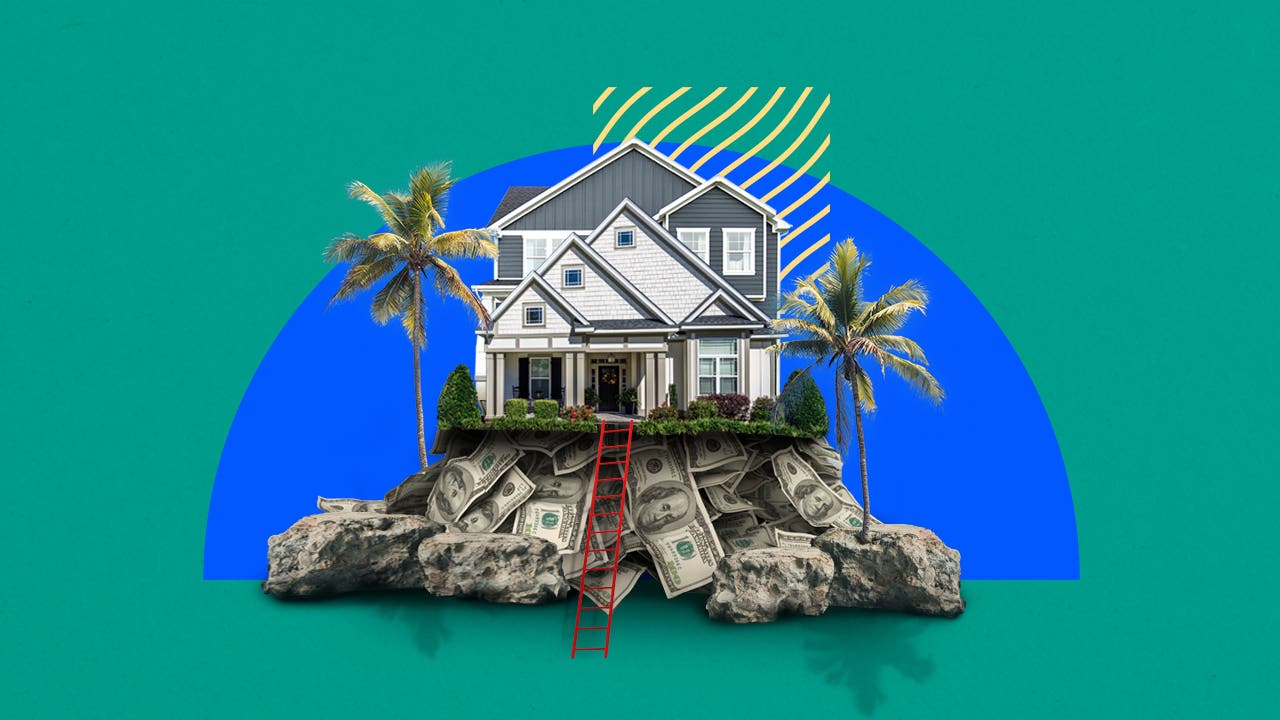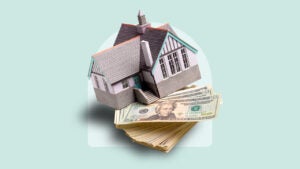How to build equity in your home in 2026 (and why you should)




Key takeaways
- Building home equity can be a reliable way to create wealth while also helping you maintain the home while you’re living in it.
- Building home equity generally involves increasing your property’s value or decreasing your mortgage debt, or some combination of both.
- Increases in home equity go hand in hand with rises in property values in general.
Home equity represents the ownership stake you have in your residence. As you pay down your mortgage or your property’s value rises, your equity increases.
Enhancing home equity helps you build a valuable asset over time and can increase your overall net worth. Because of this, it’s crucial to understand how to build equity in your home — both before you buy it, and as you continue to live in it.
Building home equity can be a reliable way to create wealth and help you maintain the home — while living there.— Linda Bell, Senior Writer, Bankrate
What is home equity?
Home equity is the portion of your home that you own outright, free and clear of any debt obligations attached to it. If you bought your home all in cash or have paid off your mortgage, you have a 100 percent equity stake in your home. Otherwise, your home equity is calculated by subtracting your mortgage balance from the home’s current market value.
Say your home is worth $350,000 and you owe $150,000 on your mortgage. To determine your home equity, you use this simple formula:
$350,000 − $150,000 = $200,000
You have $200,000 in home equity — a 57 percent equity stake.
Generally, the more equity you have, the more money you can borrow via a home equity loan or home equity line of credit.
$213,000
Source: ICE Mortgage Technology
How to build equity in your home
Growing equity generally involves increasing your property’s value, reducing your mortgage debt or a combination of both. Below are a few options available to homeowners.
1. Make a big down payment
Building equity starts the moment you make your down payment. So, the more cash you contribute towards the home purchase, the bigger your ownership stake. While it may be possible to buy a house with as little as 3 percent or even zero percent down, a larger down payment instantly boosts your home equity.
When calculating your down payment, consider how much savings you’ll have remaining after closing. Leaving yourself with little to no cash reserves makes it harder to cover your monthly mortgage payment, handle financial emergencies and prepare for home maintenance costs, which typically run about 1 percent of the home’s value in the first year.
If you can put down at least 20 percent on the home purchase, you’ll also avoid having to pay private mortgage insurance (PMI) each month. It’s an additional surcharge built into your mortgage payment — a burden you don’t need. Avoiding having PMI (or MIP, if it’s an FHA loan) added to your mortgage payment can free up funds each month and can help increase your home equity.
2. Get the cheapest loan possible
The cost of your loan plays a part in equity-building, too: The faster you can pay down the loan principal, the quicker your equity stake increases. So you want to pay as little in interest as possible.
With that goal in mind, shop around with multiple mortgage lenders and consider different types of mortgages, as some offer lower interest rates.
You might also consider a mortgage with a term shorter than the traditional 30 years. Not only is its interest rate lower, but you settle the debt sooner.
3. Pay closing costs out of pocket
When you take out a mortgage, your lender may offer to roll the closing costs into the loan itself. This can be tempting, as these upfront expenses often add up to several thousand dollars — as much as 5 percent of your loan. But financing your closing costs increases the monthly amount you owe (loan principal and interest), not to mention the interest you’ll be paying on those costs for several decades.
Paying closing costs and other fees upfront is a more economical move. It will help boost your equity because it means more of your dollars are going toward the loan principal, and it keeps the principal (and the amount of interest charged on it) smaller.
4. Increase the property value
Home renovations can boost a property’s value and, therefore, your equity. Just keep in mind that you likely won’t recoup all the money you put into home projects. Some projects offer a better return on investment than others.
For example, according to the Journal of Light Construction’s 2025 Cost vs Value report, the average upscale bathroom remodel provides a 36 percent return on investment, while a classic wood deck recoups 95 percent of its cost. The project with the biggest bang-for-the-buck? Replace the garage door, which offers a whopping 268 percent return at resale.
Before taking on your next remodel, do some research or consult a real estate agent to get a sense of which improvements offer the best return on investment.
Regular maintenance also protects and increases your home’s value and, in turn, its equity.
“Taking care of small issues when they pop up can prevent them from turning into major, more expensive problems down the line,” says Bell. “A cracked foundation or leaky roof can easily become a big headache. It’s important to keep your property in good condition. Staying on top of upkeep is one of the smartest investments you can make as a homeowner.”
5. Pay more on your mortgage
As you pay down the mortgage, your equity stake increases. While you’ll always pay both principal and interest, a larger portion of your payment initially goes toward interest, and over time, more goes toward the principal.
However, if you make extra principal payments each month, you build home equity quickly by reducing the overall amount owed. If you have the means to pay a little extra, call your loan servicer and ask how to do it. Check your monthly statements to ensure the extra money is applied to the principal.
Here are a few ways to pay your mortgage off faster:
- Switch to biweekly mortgage payments. Split your mortgage payment in half and send each half every two weeks, rather than once at the end of the month. This adds one extra payment to your mortgage every year, which can ultimately shorten your loan term and save you money on interest.
- Add a set amount each month. Check your budget to see how much extra you can realistically put toward your mortgage every month. For example, if you just paid off your car loan, consider putting that extra $250 toward the mortgage every month.
- Use windfall funds. Any time you receive a tax refund, a bonus at work or a cash gift, put it toward your mortgage principal balance.
6. Refinance to a shorter loan term
A shorter loan term has two main benefits: You typically get a lower interest rate, and more of your mortgage payment goes toward the principal each month. Choosing a 15-year mortgage from the start helps you build more equity every month than you would with a 30-year mortgage, because you’re paying down the debt faster. If you already have a mortgage, you can refinance into a shorter-term loan.
However, there’s a catch: Payments are higher on a shorter loan. Make sure there’s room in your budget for that larger mortgage payment before you opt for the shorter-term loan or refinance to one.
If you’re refinancing your mortgage, opt for a traditional rate-and-term refinance over a cash-out refinance. In a cash-out refi, you’re replacing your old mortgage with a bigger one; the extra money you receive outright in cash. This amount is based on the value of the equity you currently have in the home.
Basically, you’re borrowing against your ownership stake, which essentially reduces it. You’re taking equity out of the house, which isn’t good if your goal is to increase it.
7. Wait for your home value to rise
Local housing markets change over time, so your home’s value might fluctuate. When property prices increase in your neighborhood and demand grows, the value of your home rises. Conversely, when home prices drop, your equity loses some of its worth.
While you don’t have much control over real estate market fluctuations or economic conditions, keeping your home in good condition and avoiding tapping your home’s equity can best protect your home’s value.
Why building equity in your home is important
Building home equity is important for a few reasons. “It can be a reliable way to create wealth and help you maintain the home while living there,” says Linda Bell, senior writer for Bankrate’s Home Lending team.
Building equity in a property means:
- You have a source of income. You can borrow against your home equity for nearly any purpose. The most common ways to do so are home equity loans and home equity lines of credit (HELOCs), generally available once you have a 15 to 20 percent equity stake.
- You’re more likely to make a profit when you sell, even if you still have an outstanding loan balance. Building equity means you have a much better chance of selling the property for more than you owe on the mortgage, even if the market takes a downturn. You can use the profits from the sale to purchase another home, pay off other debt or invest it elsewhere.
- You can build long-term wealth. Building home equity can help you increase your net worth over time, especially if you purchased your home when the market was in the buyers’ favor. A home is one of the few types of collateral that has the potential to appreciate in value (cars, for example, depreciate over time). It can also furnish a source of wealth for your descendants.
How home values impact home equity in 2025
Despite some of the highest interest rates in the past two decades, home prices have continued to climb in 2025. The August median sale price of an existing home in the U.S. rose to $422,600, the 26th consecutive month of year-over-year price increases, according to the National Association of Realtors (NAR).
That’s bad news for homebuyers — but happy tidings for homeowners. As home prices have climbed, so has the worth of Americans’ home equity. According to the Cotality’s latest Homeowner Equity Insights report, homeowners with mortgages possessed $17.5 trillion in Q2 2025, or about $307,000 per homeowner — the third-highest average equity amount in recorded history, per Cotality.
The cost of tapping into that equity wealth has decreased this year. As of October 2025, both HELOC rates and home equity loan rates hit a two-year low.
The rise in home prices has slowed somewhat, and so has the growth in home equity. According to NAR’s August 2025 data, median home sale prices have risen 2 percent year-over-year. But don’t expect a dramatic uptick in the number of homes available for sale. Many existing homeowners will still be unwilling to put their homes on the market and lose the low interest rates they scored days of yore to buy a new place. Given this tight inventory, it’s not likely that values will decline substantially, if at all.
“Housing unaffordability challenges are a modern fact of life,” says Mark Hamrick, senior economic analyst for Bankrate. “Even if we see a modest decline in mortgage rates over the next year, that’s only going to slightly move the needle. For many aspiring homeowners, this will make a prospective purchase a continuing challenge.”
In short: Home prices will stay relatively high, residential real estate will continue to appreciate — and so will homeowners’ equity stakes.
Bottom line
Overall, “it’s important to weigh the pros and cons of accessing your home equity before moving forward,” Bell says. “Ensure you can take on the additional debt load because you can lose your home if you can’t keep up with payments.”
“Also, if home values fall after you’ve tapped your equity, you could go from equity-rich to negative equity in a heartbeat and owe more than your property is worth.”
Be sure to evaluate how quickly you can rebuild your equity, too. Because, whether it’s buoyed by a hot market or by paying off a mortgage (or both), a rich equity stake benefits a homeowner in a variety of ways, both long-term and for immediate aims.
Frequently asked questions
Why we ask for feedback Your feedback helps us improve our content and services. It takes less than a minute to complete.
Your responses are anonymous and will only be used for improving our website.





